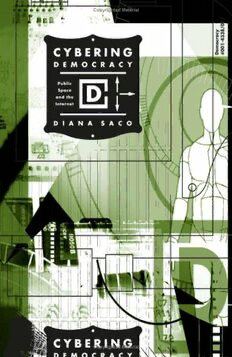Download Cybering Democracy: Public Space and the Internet PDF Free - Full Version
Download Cybering Democracy: Public Space and the Internet by Diana Saco in PDF format completely FREE. No registration required, no payment needed. Get instant access to this valuable resource on PDFdrive.to!
About Cybering Democracy: Public Space and the Internet
The Internet has been billed by some proponents as an "electronic agora" ushering in a "new Athenian age of democracy." That assertion assumes that cyberspace's virtual environment is compatible with democratic practice. But the anonymous sociality that is intrinsic to the Internet seems at odds with theories of democracy that presuppose the possibility, at least, of face-to-face meetings among citizens. The Internet, then, raises provocative questions about democratic participation: Must the public sphere exist as a physical space? Does citizenship require a bodily presence? In Cybering Democracy, Diana Saco boldly reconceptualizes the relationship between democratic participation and spatial realities both actual and virtual. She argues that cyberspace must be viewed as a produced social space, one that fruitfully confounds the ordering conventions of our physical spaces. Within this innovative framework, Saco investigates recent and ongoing debates over cryptography, hacking, privacy, national security, information control, and Internet culture, focusing on how different on-line practices have shaped this particular social space. In the process, she highlights fundamental issues about the significance of corporeality in the development of civic-mindedness, the exercise of citizenship, and the politics of collective action. Diana Saco is an independent scholar based in Fort Lauderdale, Florida.
Detailed Information
| Author: | Diana Saco |
|---|---|
| Publication Year: | 2002 |
| ISBN: | 9780816635405 |
| Pages: | 326 |
| Language: | English |
| File Size: | 1.991 |
| Format: | |
| Price: | FREE |
Safe & Secure Download - No registration required
Why Choose PDFdrive for Your Free Cybering Democracy: Public Space and the Internet Download?
- 100% Free: No hidden fees or subscriptions required for one book every day.
- No Registration: Immediate access is available without creating accounts for one book every day.
- Safe and Secure: Clean downloads without malware or viruses
- Multiple Formats: PDF, MOBI, Mpub,... optimized for all devices
- Educational Resource: Supporting knowledge sharing and learning
Frequently Asked Questions
Is it really free to download Cybering Democracy: Public Space and the Internet PDF?
Yes, on https://PDFdrive.to you can download Cybering Democracy: Public Space and the Internet by Diana Saco completely free. We don't require any payment, subscription, or registration to access this PDF file. For 3 books every day.
How can I read Cybering Democracy: Public Space and the Internet on my mobile device?
After downloading Cybering Democracy: Public Space and the Internet PDF, you can open it with any PDF reader app on your phone or tablet. We recommend using Adobe Acrobat Reader, Apple Books, or Google Play Books for the best reading experience.
Is this the full version of Cybering Democracy: Public Space and the Internet?
Yes, this is the complete PDF version of Cybering Democracy: Public Space and the Internet by Diana Saco. You will be able to read the entire content as in the printed version without missing any pages.
Is it legal to download Cybering Democracy: Public Space and the Internet PDF for free?
https://PDFdrive.to provides links to free educational resources available online. We do not store any files on our servers. Please be aware of copyright laws in your country before downloading.
The materials shared are intended for research, educational, and personal use in accordance with fair use principles.

